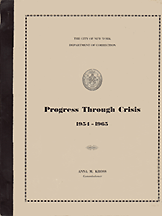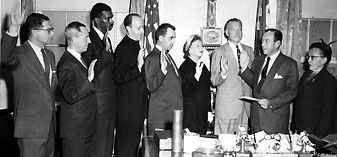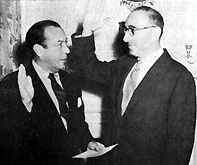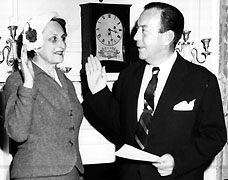
Mrs. Rose M. Singer, the ninth Board
of Correction member sworn by Mayor Wagner, took the oath on Nov. 27, 1957. [From 1957 annual report.]
|
BOARD OF CORRECTION OF
THE CITY OF NEW YORK
[Extracted from NYC DOC 1957 annual report.]
For the first time in the history of the Department
of Correction it will have a new management tool, long overdue, that will
prove beneficial to the city, the department and our personnel, who in
the past have had to face constant administrative upheavals, disruptive
organizational and costly policy changes, which in the final analysis have
directly affected the care, custody and treatment of our inmates, who are
our prime problems and responsibility.
This new Board will act in an official
advisory capacity to the department and assure continuity of planning.
Mayor Wagner signs Local Law No. 25, creating Correction Board for New York City June 5, 1957. | 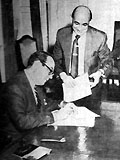 |
The [1957] law [reads] as follows:
THE COUNCIL
City of New York
Int. No.687 (No.803) Local Law 25 February 5, 1957
Introduced by the Vice-Chairman (MR. SHARKEY by request
of the Mayor) -- read and referred to the Committee on General Welfare.
TO amend the New York city charter to establish a
city board of correction.
Be it enacted by the Council as follows:
Section 1. Chapter twenty-five of the New York city
charter is hereby amended by adding thereto a new section, to follow section six hundred twenty-five, to be section six hundred twenty-six, to read as follows:
Board of correction
626a. There shall be a city board of correction to
consist of nine members to be appointed by the mayor for a term of six
years, provided, however, that of the members first appointed, three shall
be appointed for a term of two years, three shall be appointed term of
four years, and three shall be appointed for a term of six years. Vacancies
occurring in such board, otherwise than by expiration of term, shall he
filled for the unexpired term. Members of the board shall serve without
compensation but may be reimbursed for expenses incurred in the performance
of their duties. The chairman of board shall be designated from time to
time by the mayor from among its members. Members of the board may be removed
by the mayor for cause and after a hearing at which they shall he entitled
to representation by counsel.
The board shall adopt rules to govern its own proceedings.
The secretary of the department shall act as secretary to the board and
shall keep a record of its proceedings.
The commissioner shall designate such of the department's
stenographic, clerical and other assistance to the board as may be necessary
for the proper performance of its functions. The commissioner may attend
meetings of the board but shall not be a member thereof.
b. The board shall have the following powers and duties:
1. The inspection and visitation of all institutions
and facilities under the jurisdiction of the department.
2. The inspection of all books, records, documents,
and papers of the department.
3. The preparation for submission to the mayor and
the commissioner of
(a) proposals for long-range capital planning
(b) studies and reports concerned with the development
of the department s correctional program planning
(c) studies and reports in regard to methods of promoting
closer cooperation of custodial, probation and parole agencies of government.
4. The evaluation of departmental performance.
c. The board
shall annually and at such other times as it may determine, submit to the
mayor and the commissioner reports, findings and recommendations in regard
to the matters within its jurisdiction.
§ This law shall take effect immediately.
[Later City Charter provisions have expanded and strengthened the role of the Board since the original 1957 law quoted above.]
|
The record indicates that the original recommendation
for a Board of Correction dates back to 1954, when this administration
took office.
In preparing the previous administration's report
for 1953, Commissioner Kross recommended:
"A citizen's advisory board that will have far reaching
significance in promoting realistic treatment programs is being developed
comprising educators, professional business men and people in the
field of medicine, psychiatry and social work who have been recognized
for their foresight and vision and are particularly interested in the social
problems of those neglected physically and mentally ill individuals who
come in conflict with the law."
Commissioner Kross went on to appoint and create a
Citizens' Advisory Committee, which had been operating for the past
three years, consisting of outstanding members of the community. The members
of the Citizens' Advisory Committee consisted of the following:
- Rev. Robert J. McCracken, Chairman
- Brooke Alexander
- Rev. Vincent de P. Lee, S. J.
- Mrs. Yorke Allen
- Kenneth Johnson
- Ralph S. Banay, M.D.
- Morris E. Lipsett
- Edward L. Bernays
- John Lotz
- Mrs. Sidney C. Borg*
- Peter M. Murray, M.D.
- Robert W. Dowling
- Rev. Dr. Nathan Perilman
- Dr. Rose N. Franzblau
- Mrs. Harriet Pilpel
- Arthur Harckham
- William J. Ronan
- Mrs. John T. Harrison, Jr.
- Dr. Robert W. Searle
- Leonard Harrison
- G. Howland Shaw
- Fanny Hurst
- Charles S. Whitman, Jr.
- Morris Iushewitz
- Ethel H. Wise
*Deceased
Approximately one year ago the committee appointed
by Mayor Robert F. Wagner to examine, survey and make recommendations for
the reorganization of the Department of Correction submitted its report.
This document, completed by the committee, on which Commissioner Anna
M. Kross served, represented months of painstaking and intensive research
into the intricate operations of the department.
One of the basic considerations, which this administration long advocated, was the official appointment of a departmental Advisory Board to provide program and administrative continuity.
This was at long last realized when Mayor Robert F. Wagner signed Local Law No. 25 on June 5, 1957, amending the New York City Charter for the establishment of a nine member, non-salaried, Board of Correction for the City of New York.
The members of the Board were appointed on October 3, 1957. Members of the non-salaried Board are:
For terms expiring October 13, 1959:
Lisle C. Carter, Jr., lawyer, former official, the
Urban League of Greater New York; Robert E. Curry, President-Elect of the
Catholic Big Brothers of New York; Rev. Sidney G. Menk, Chairman, of the
Board of Christian Education of the Protestant Council of the City of New
York.
For terms expiring October 13, 1961:
D. John Heyman, former associate director of the Home
Advisory Council, Inc., of the City Magistrates' Courts, and the New York
Foundation; Carl M. Loeb, Jr., President, Community Council of the Greater
New York, Inc.; Mrs. Rose M. Singer, civic worker.
For terms expiring October 13, 1963:
Rev. Vincent de Paul Lee, S. J. Regent, Fordham University
School of Social Service; Ethel H. Wise, President of the Hillcrest Center
for Children, and Rev. Robert J. McCracken, of Riverside Church.
Mr. Carl M. Loeb, Jr., has been designated Chairman
of the Board and the Rev. Robert J. McCracken, as Vice-Chairman.
The Board has the power to inspect all institutions under the jurisdiction of the Department of Correction.
It is charged with making proposals for long-range planning to the Mayor and Commissioner of Correction.
The Board is also to make studies and reports concerning development of the correctional programs and to give continuity to penological advances heretofore curtailed by changes in administrations.
The New York City Department of Correction has, at long last, achieved one of its primary goals and recommendations in the official establishment by law of a Board of Correction.
|
